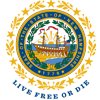Search and Rescue Funding
Fish And Game Cost Of Search And Rescue Activities
 The New Hampshire Fish and Game Department is mandated by current law to conduct all search and rescue missions that occur within the woodlands and waterways of our state. For over six decades now, Fish and Game has met these mandated responsibilities. In 1989, a legislated funding mechanism to support this effort was created. This funding mechanism is a $1.00 fee collected for each boat, snowmobile and OHRV registered in New Hampshire.
The New Hampshire Fish and Game Department is mandated by current law to conduct all search and rescue missions that occur within the woodlands and waterways of our state. For over six decades now, Fish and Game has met these mandated responsibilities. In 1989, a legislated funding mechanism to support this effort was created. This funding mechanism is a $1.00 fee collected for each boat, snowmobile and OHRV registered in New Hampshire.
In 2015, a second funding mechanism for search and rescue was established. This was the creation of a voluntary Hike Safe card. Both of these funding mechanisms, as well as any donations and reimbursements (see below), make up the Search and Rescue Fund. Each year Fish and Game must cover any costs above and beyond what is in the Search and Rescue Fund with revenue from hunting and fishing license fees in the Fish and Game Fund.
Rising Cost of Rescues
From 2011 to 2015, Search and Rescue expenditures had exceeded annual revenues by more than $200,000. For several legislative sessions, New Hampshire Fish and Game had made a dozen attempts to request legislation in an effort to meet the fast-growing deficit occurring each year; all of those attempts failed. As a consequence of the financial shortfall in the Search and Rescue Fund, Fish and Game Law Enforcement had been forced to sacrifice Conservation Officer positions, equipment, training and other safety-related programs in an effort to redirect these funds to cover the rising cost of rescues.
In 2015, the Search and Rescue Fund shortfall slowly began to diminish due to the sale of the newly created Hike Safe Cards. From 2015 to present day, the sale of Hike Safe Cards continues to grow. From 2015 to 2019, the sale of Hike Safe cards generated an average of $118,956 into the Search and Rescue Fund.
In 2008, a law passed allowing Fish and Game to request reimbursement from persons determined to be negligent in creating a situation where a rescue was required. This law was created to provide the means to recoup the cost of the resources expended in the execution of avoidable missions. In reality, this law has done little to address any shortfall in the Search and Rescue Fund. The success rate for collecting on such incidents averages about 61%. Approximately two dozen rescues each year fall into this category.
Who's Getting Rescued?
Over the past ten fiscal years (FY 2009-FY 2019), New Hampshire Fish and Game has conducted a total of 1,890 reportable Search and Rescue missions at a total cost of approximately $3.1 million. An average of 62% of all of these missions were rescues of hikers and climbers. Another 14% of searches were initiated for individuals who suffered from mental illness or were designated as walk-aways/runaways.
Just 11% of all search and rescue missions were conducted for a combination of hunters, anglers, boaters and OHRV/ATV riders during this period.
By The Numbers: NH Search And Rescue Activities - FY09-19
Over the past ten years, NH Fish and Game completed a total of 1,890 reportable Search and Rescue (SAR) missions at a total cost to the Department of $3.1 million. An average of 190 missions were conducted each year. The average cost of each mission was $1,635.
Of the total 1,890 Search and Rescue missions:
- 1,187 missions were required for hikers and climbers. This represents approximately 62% of all SAR missions.
- 198 SAR missions were required for hunters, anglers, boaters and OHRV riders, representing approximately 11% of all SAR missions.
- 271 missions were searches for walk-aways/runaways. This represents approximately 14% of all SAR missions.
- 127 missions were for drownings/swimming related. This represents approximately 7% of all SAR missions.
- 13 missions were for cross country skiers. This represents approximately 0.7% of all SAR missions.
- 138 missions were categorized as “other”. This category would include missions involving assisting other LE agencies with criminal cases, evidence location, etc. This represents approximately 7% of all SAR missions.
- 830 SAR missions occurred within the White Mountain National Forest. This represents approximately 44% of all SAR missions within the past ten years took place on National Forest lands.
Search and Rescue Account:
- Approximate revenue for each of the past ten years generated by a $1.00 fee added to every boat, OHRV and snowmobile registration plus any donations and reimbursements averages $191,623.
- Hike Safe card program has generated an average of $118,956 per year since it's inception in 2015.
- Fish and Game annual Search and Rescue expenditures for the past ten years averaged a total of $308,952.
To learn more about NH Fish and Game Search and Rescue funding, read the Funding FAQs.



